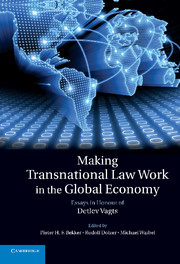Book contents
- Frontmatter
- Contents
- List of contributors
- Foreword: the transnationalism of Detlev Vagts
- List of cases cited
- List of abbreviations and acronyms
- Introduction: a Festschrift to celebrate Detlev Vagts' contributions to transnational law
- 1 Detlev Vagts and the Harvard Law School
- 2 Constructing and developing transnational law: the contribution of Detlev Vagts
- I International law in general
- II Transnational economic law
- III Transnational lawyering and dispute resolution
- 23 Diffusion of law: the International Court of Justice as a court of transnational justice
- 24 Regulating counsel conduct before international arbitral tribunals
- 25 International arbitrators as equity judges
- 26 Customary international law, Congress and the courts: origins of the later-in-time rule
- 27 Mediation and civil justice: a public–private partnership?
- 28 The borders of bias: rectitude in international arbitration
- 29 Managing conflicts between rulings of the World Trade Organization and regional trade tribunals: reflections on the Brazil – Tyres case
- 30 Cross-border bankruptcy as a model for the regulation of international attorneys
- Bibliography of Detlev Vagts
- Index
27 - Mediation and civil justice: a public–private partnership?
from III - Transnational lawyering and dispute resolution
Published online by Cambridge University Press: 17 November 2010
- Frontmatter
- Contents
- List of contributors
- Foreword: the transnationalism of Detlev Vagts
- List of cases cited
- List of abbreviations and acronyms
- Introduction: a Festschrift to celebrate Detlev Vagts' contributions to transnational law
- 1 Detlev Vagts and the Harvard Law School
- 2 Constructing and developing transnational law: the contribution of Detlev Vagts
- I International law in general
- II Transnational economic law
- III Transnational lawyering and dispute resolution
- 23 Diffusion of law: the International Court of Justice as a court of transnational justice
- 24 Regulating counsel conduct before international arbitral tribunals
- 25 International arbitrators as equity judges
- 26 Customary international law, Congress and the courts: origins of the later-in-time rule
- 27 Mediation and civil justice: a public–private partnership?
- 28 The borders of bias: rectitude in international arbitration
- 29 Managing conflicts between rulings of the World Trade Organization and regional trade tribunals: reflections on the Brazil – Tyres case
- 30 Cross-border bankruptcy as a model for the regulation of international attorneys
- Bibliography of Detlev Vagts
- Index
Summary
Introduction
For the last thirty years in the United States and for the last ten years in England, Germany, Italy and other continental systems, various forms of mediation have been increasingly incorporated into the processes of civil justice. Interparty mediation by neutral third parties to facilitate settlements of civil disputes has become more and more commonplace in all public processes of dispute resolution. This mediation can take several forms, ranging from informal efforts by the trial judge to encouraging parties to settle the pending dispute to highly formalised settlement proceedings conducted by private professional mediators retained by the parties or appointed by the court.
To date, court-annexed mediation has met with a generally enthusiastic reception by parties, courts, lawyers and academics. There is an abundant literature documenting the value of mediative techniques to facilitate case settlement, both anecdotally and statistically. The predominant tone of academic literature to date praises mediation for its flexibility, maintenance of party autonomy, ability to save costs of contested proceedings and the value of termination of disputes by agreement. Court decisions, on the other hand, are discounted as expensive, delayed and often not well adapted to the parties' real needs.
The American civil justice system, with its high level of adversariality and expensive cost profile based on the jury trial model, has offered particularly fertile ground for the growth of alternative dispute resolution (ADR) and incorporation of ADR into public justice processes. Incorporation of ADR modalities in civil justice processes has proceeded more slowly in Europe.
- Type
- Chapter
- Information
- Making Transnational Law Work in the Global EconomyEssays in Honour of Detlev Vagts, pp. 560 - 576Publisher: Cambridge University PressPrint publication year: 2010



